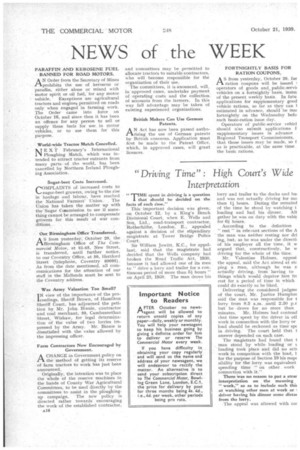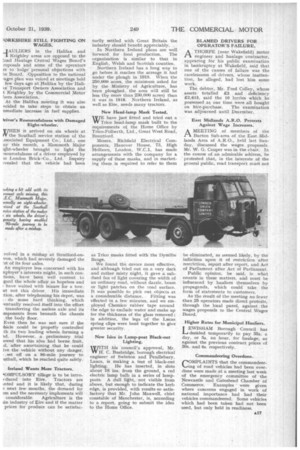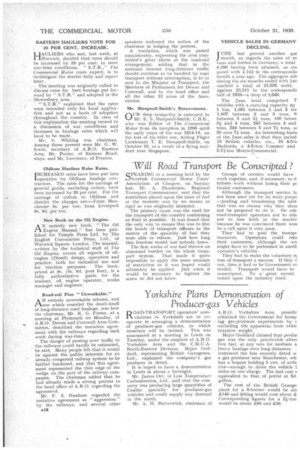"Driving Time" : High Court's Wide Interpretation
Page 18

Page 19

Page 20

If you've noticed an error in this article please click here to report it so we can fix it.
" rrIME spent in driving is a question 1 that should be decided on the facts of each c'ase."
This important decision was given, on October 12, by a King's Bench Divisional Court, when E. Wells and Son, Ltd., road-transport contractor, Rotherhithe, London, E., appealed against a decision of the stipendiary magistrate at Tower Bridge Police Court.
Sir William Jowitt, K.C., for appellant, said that the magistrate had decided that the Wells company had broken the Road Traffic Act, 1930, because it had allowed one of its men to " drive a lorry and trailer for a continuous period of more than 5i hours " on April 23, 1938. The man drove his
lorry and trailer to the docks and ba. and was not actually driving for mo than l hours. During the remaind of the time he stood by watching t
loading and had his dinner. Alt gether he was on duty with the vehic for.% hours.
According to the definition " rest " in relevant sections of the A the man was neither resting nor dri ing, but, as he was under the directi. of his employer all the time, it w argued that, constructively, he w driving for the whole of the time.
Mr. Valentine Holmes, opposi the appeal, said the Act aimed at stc ping a man, although he was n actually driving, from " having to things which would deprive him frc rest for a period of time in which could do exactly as he liked. • Delivering the considered judgmc of the court, Mr. Justice Humphrc said the man was responsible for t lorry from 8.5 a.m. until 2.30 p.r but he • drove for no more than minutes. Mr. Holmes had contend that time spent by the driver in otl work in connection with the lorry or load should be reckoned as time sr.( in driving. The court held that answer depended on each case.
The magistrate had found that I man stood by while. loading or t loading took place and did no acti work in connection with the load, 1 for the purpose of Section 19 his reap( sibility for the lorry was equivalent spending time " on other work connection with it."
There was no reason to put a strar interpretation on the meaning " work," so as to include such thiL at watching other men at work or I driver having his dinner some distal from the lorry.
The appeal was allowed with co ;ORKSHIRE STILL FIGHTING ON WAGES.
4AULIERS in the Halifax and Keighley areas are opposed to the :oad Haulage Central Wages Board's roposals and some of the operators re to lodge personal objections with Se Board. .Opposition to the national 'ages plan was voiced at meetings held few days ago at Halifax by the Hallea Transport Owners Association and t Keighley by the Commercial Motor rsers Association.
At the Halifax meeting it was also ecided to take steps to obtain an nmediate increase in fuel supplies.
river's Resourcefulness with Damaged Eight-wheeler.
yjHEN it arrived on six wheels at ror the Southall service station of the ,ssociated Equipment Co., Ltd., one ay this month, a Mammoth Major ight-wheeler brought to light the asourcefulness of a driver employed by se London Brick .Co., Ltd. Inquiry vealed that the vehicle had been .volved in a mishap at Stratford-onvon, which had severely damaged the 7st of its four axles.
An employee less concerned with his nployer's interests might, in such contions, have been well content to gard the whole affair as hopeless and have waited with leisure for a tow. ut not this driver. His immediate ;tion, after telephoning his depot, was do some hard thinking, which rentually resolved itself into the effort transferring the useless axle and its i:nponents from beneath the chassis the body floor.
Even then he was not sure if the bide could he properly controlled th its two leading wheels forming a ad. However, a preliminary trial owed that his idea had borne fruit, .d, after ascertaining that he could ive the vehicle without any danger, set off on a 90-mile journey to uthall, which he reached quite safely.
Ireland Wants More Tractors.
40MPULSORY tillage is to be intro • thiced into Eire. Tractors are onted and it is likely that, during 2 next few months, the demand for am and the necessary implements will considerable. Agriculture is the tin industry of Eire and if the matter prices for produce can be satisfac
torily settled with Great Britain the industry should benefit appreciably. .
In Northern Ireland plans are well forward for food production. The organization is similar to that in English, Welsh and Scottish counties.
Northern Ireland has a long way to go before it reaches the acreage it had under the plough in 1018. When the 250,000 acres, the minimum asked for by the Ministry of Agriculture, has been ploughed. the area will still be less (by more than 230,000 acres) than it was in 1918. Northern Ireland, as well as Eire, needs many tractors.
New Head-lamp Mask Tested.
WE have just fitted and tried out a Trico head-lamp mask built to the requirements ot the Home Office by Trico-Folberth, Ltd., Great West Road, Brentford.
Messrs. Richfield Electrical Components, Hanover House, 73, High Holborn, London, W.C.1, has made arrangements with the company for a supply of these masks, and in marketing them is required to refer to them as Trico masks fitted with the Dymlite flange.
We found the device most effective, and although tried out on a very dark and rather misty night, it gave a subdued fan of light covering the width of an ordinary road, without dazzle, beam or light patches on the road surface. It was possible to pick out objects at a considerable distance. Fitting was effected in a few minutes, and we employed Chemico rubber tape around the edge to exclude water and make up for the thickness of the glass removed ; in addition, the legs of the Lucas spring clips were bent together to give greater security.
New Idea in Lamp-post Black-out Lighting.
'WITH his council's approval, Mr. VV H. C. Busbridge, borough electrical engineer of Swinton and Pendlebury, Lanes, is making a test of black-out lighting. He has inserted, in slots about 18 ins, from the ground, a red electric lamp bulb in a series of lampposts. A dull light, -not visible from above, but enough to indicate the kerb edge, is provided, with results so satisfactory that Mr, John Maxwell, chief constable of Manchester, is, according to a report, going to submit the idea to the Home Office. BLAMED DRIVERS FOR OPERATOR'S FAILURE.
A THORPE (near Wakefield) motor Pt engineer and haulage contractor, appearing for his public examination in bankruptcy at Wakefield, said that one of the causes of failure was the carelessness of drivers, whose inattention, be alleged, had lost him some work.
The debtor, Mr. Fred Colley, whose assets totalled £3 and deficiency £2,615, said the 10 lorries which he possessed at one time were all bought on hire-purchase. The examination was adjourned until December.
East Midlands A.R.O. Protests Against Wage Increases.
AMEETING of members of the Burton Sub-area of the East Midlands Area of A.R.O., held last Sunday, discussed the wages proposals. Mr. W. G. Cooper was in the chair. In the course of an admirable address, he protested that, in the interests of the general public, road transport must not
be eliminated, as seemed likely, by the infliction upon it of restriction after restriction, report after report, and Act of Parliament after Act of Parliament.
Public opinion, he said, is what counts in these matters, and must be influenced by hauliers themselves by propaganda, which could take the form of statements to customers.
As the result of the meeting no fewer than 25 operators made direct protests, through the local panel, against the wages proposals to the Central Wages Board.
Higher Rates for Municipal Hauliers.
LEWISHAM Borough Council has decided temporarily to pay 35s. a day, or 5s. an hour, for haulage, as against the previous contract prices of 30s. and 4s. respectively.
Commandeering Overdone.
00141PLAINTS that the commandeer
ing road vehicles had been overdone were made at a meeting last v.eek of the emergency committee of the Newcastle and Gateshead Chamber of Commerce. Examples were given where concerns engaged in work of national importance had had their vehicles commandeered. Some vehicles which had been taken had not been used, but only held in readiness.
EASTERN HAULIERS VOTE FOR 20 PER CENT. INCREASE.
HAULIERS who met, last week, at 'Norwich, decided that rates should be increased by 20 per cent. to meet war-time conditions. " S.T.R.," The Commercial Motor costs expert, is to investigate the matter fully and report later.
The meeting was originally called to discuss rates for beet haulage put forward by " S.T.R." and adopted in the Shrewsbury area.
" S.T.R. ' explained that the rates were intended only for local application and not as a basis of adoption throughout the country. In view of this explanation the meeting turned to a discussion of war conditions and increases in haulage rates which will have to be made.
Mr. S. Whiting was chairman. Among those present were Mr. G. W. Irwin, secretary of A.R.O. Eastern Area, Mr. Porter, of Eastern Roadways, and Mr. Lawrence, of Preston.
Oldham Hauliers Raise Rates.
I NCREASED rates have been put into operation by Oldham haulage contractors. The rates for the carriage of general goods, excluding cotton, have been increased by 20 per cent. For he carriage of cotton to Oldham and district the charges are:—From Manchester 5s. per ton; from Liverpool 9s. 6d. per ton.
New Book on the Oil Engine.
AN entirely new book, "The Oil
• Engine Manual," has been published for Temple Press Ltd. by The English Universities Press, Ltd., of Warwick Square, London. The manual, written by the technical staff of The Oil Engine, covers all aspects of oilengine (Diesel) design, operation and practice, both for industrial use and for traction purposes. The book, priced at 5s. (5s. 6d. post free), is a fully authoritative guide for the student, oil, engine operator, works manager and engineer.
Road-rail Plan "Unworkable."
AN entirely unworkable scheme, and one which e sounded the death-knell of long-distance road haulage, was how the chairman, Mr. K. G. Foster, at a meeting at Plymouth on Monday, of A.R.O. Devon and Cornwall Area Committee, described the tentative agreement with the railways regarding such work during war-time.
The danger of passing over traffic to the railways could hardly be estimated, he said. Many people felt that it would be against the public interests for an already congested railway system to be further burdened, and that this agreement represented the thin edge of the wedge on the part of the railway companies. The chairman added that he had already made a strong protest to the head office of A.R.O. regarding the agreement. Mr. F. S. Huxham regarded the tentative agreement as " aggression " by the railways, and several other *18 speakers endorsed the action of the chairman in lodging the protest.
A resolution, which was passed unanimously, expressing the area committee's great alarm at the road-rail arrangement, adding that in the national interest long-distance traffic should continue to be handled by road transport without interruption, is to be sent to the Minister of Transport, the Members of Parliament for Devon and Cornwall, and to the head office and all the other 13 areas of the Association.
Mr. Shrapnell-Smith's Bereavement.
QUR deep sympathy is extended to Mr. E. S. Shrapnell-Smith, C.B.E., who was Editor of The Commercial Motor from its inception in 1905 until the early years of the war 1914-18, on the loss of his elder son, Acting Flight Lieutenant T. E. Shrapnell-Smith, on October 16, as a result of a flying accident near Singapore.
VEHICLE SALES IN GERMANY DECLINE.
!UNE last proved another qui
month, as regards the sales of ne vans and lorries in Germany, a total 4,396 having been attained, as cot pared with 4,742 in the correspondir month a year ago. The aggregate sale during the six months ended with Jun reached a total of 21,665 units, against 23,311 in the correspondit half of 1938—a drop of 1,646..
The June total comprised 7: vehicles with a carrying capacity up 1 ton, 1,061 between 1 and 2 tor 1,037 between 2 and 3 tons, 8 between 3 and 31 tons, 188 betwe 34. and 4 tons, 243 between 4 and tons, 244 between 5 and 7.i tons, ai 20 over 7-It tons. An interesting featu of the June_sales is that they includ 18 British vehicles, viz., 16 4-5-di BecIfords, a 4-5-ton Comrner and 5-7i-ton Morris-Commercial,




















































